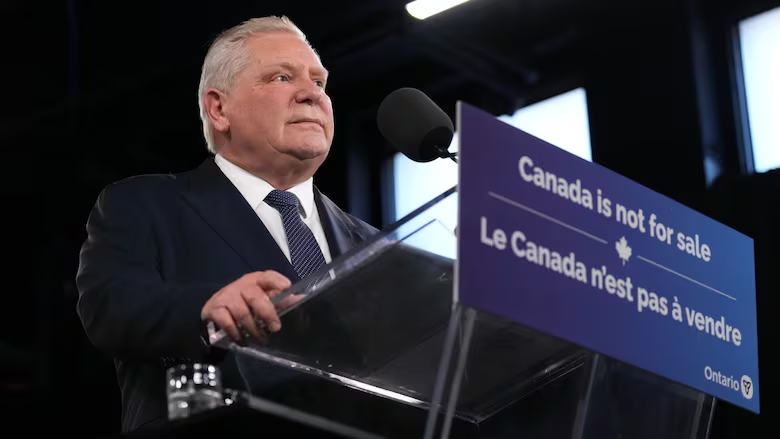The trade war between Canada and the United States has intensified, with Ontario and British Columbia taking significant retaliatory measures against tariffs imposed by U.S. President Donald Trump. These actions include a 25% surcharge on electricity exports from Ontario and a ban on American liquor sales in British Columbia.
Ontario Premier Doug Ford announced a 25% surcharge on electricity exports to the U.S., targeting states like New York, Michigan, and Minnesota. This measure, effective immediately, adds approximately $10 per megawatt-hour to electricity prices for 1.5 million American customers. The surcharge is expected to generate between C$300,000 and C$400,000 (approximately $208,710 to $278,280 USD) daily, with funds allocated to support Ontario workers, families, and businesses impacted by U.S. tariffs.
Ford criticized the tariffs as harmful to both economies, stating that they increase costs for American households and businesses. “Until these tariffs are gone for good, Ontario will not relent,” Ford declared. He also warned of potential further escalation, including cutting off electricity exports entirely if the trade conflict deepens.
The surcharge comes as part of Canada’s broader response to U.S. tariffs on Canadian goods such as orange juice, peanut butter, and motorcycles. While the impact on U.S. electricity markets may be limited due to alternative supply options, the move underscores Ontario’s firm stance against what it views as unjust trade practices.
In a parallel move, British Columbia Premier David Eby announced an immediate halt to the sale of all American-made liquor in government-run stores across the province. This decision expands an earlier ban that targeted products from “red states” that supported Trump in previous elections.
Eby cited escalating threats from the U.S., including tariffs on Canadian dairy and lumber industries and discussions about Canadian water resources and border adjustments. “If the president is so interested in Canadian water, then we’re going to help him out by letting him keep his watery beer,” Eby remarked.
The ban affects all American-made beer, wine, and spirits but excludes U.S.-branded products manufactured in Canada. The B.C. Liquor Distribution Branch has also taken steps to promote local Canadian products by adding maple leaf labels to shelves and increasing marketing for B.C.-made beverages.
These measures reflect growing tensions between Canada and the U.S., with both sides implementing retaliatory actions since Trump initiated tariffs against Canada and other trading partners. The federal government in Canada has already imposed C$30 billion in tariffs on various U.S. goods.
While these provincial actions may have limited direct economic impact on the U.S., they signal Canada’s willingness to leverage its resources strategically in this trade dispute. For Ontario, electricity exports account for a small portion of U.S. energy needs, less than 1% for states like Minnesota and Michigan, but the surcharge sends a strong political message.
In British Columbia, the liquor ban aligns with public sentiment against American products amid ongoing trade tensions. Local producers are expected to benefit from increased demand for Canadian-made goods.
As the trade war escalates, Canada’s provinces are stepping up their retaliatory efforts against U.S. tariffs. Ontario’s electricity surcharge and British Columbia’s liquor ban highlight regional strategies aimed at defending local industries while pressuring the U.S. administration to reconsider its trade policies. With no resolution in sight, these measures may only be the beginning of further economic countermeasures between the two nations.

